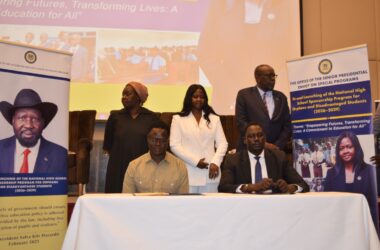By William Madouk
United Nations High Commissioner for Refugees (UNHCR), in its latest report, estimates that about 100,000 new refugees and returnees who fled violence in Sudan have entered the country.
UNCHR Assistant High Commissioner for Operation, Raouf Mazou, said South Sudan has hit a dire milestone of 100,000 new arrivals of returnees and refugees fleeing the violence in Sudan.
Addressing a press conference in Juba following a visit to Renk in Upper Nile State to assess the situation of new arrivals, he urged the international community to not forget about South Sudan.
“UNHCR and partners are appealing for USD 96 million in South Sudan to support life-saving activities for those arriving from Sudan.”
Since the start of the conflict in Sudan on April 15, thousands have fled across the border to South Sudan on a daily basis.
“Majority of people are South Sudanese, coming back to their country of origin, returning to communities still impacted by insecurity, with very limited services and infrastructure,” Mr. Mazou said.
He said the many families revealed their quest to reach their home communities while also worried about what they will find when they get there.
The returnees are arriving alongside refugees from Sudan and various nationals of other foreign countries.
“The response from the South Sudan government has been exemplary; they have kept the borders open and welcomed all people arriving,” he noted.
He noted that some areas are remote and hard to access, making it costly and complex humanitarian response and a potential crisis in the upcoming rainy season, if the people remain at the border.
Mr. Mazou also observed that the majority of those fleeing the violence are arriving after long, difficult journeys in remote towns like Renk in Upper Nile State.
Where prices of basic items have skyrocketed, many goods remain scarce in the northern part of the country, further complicating the situation for the tens of thousands still stuck in those areas.
UNHCR, the International Organization for Migration (IOM), the government, and other humanitarian partners are monitoring 27 border points across the country.
Transit centers have also been set up in key locations to provide vulnerable new arrivals with immediate lifesaving support.




